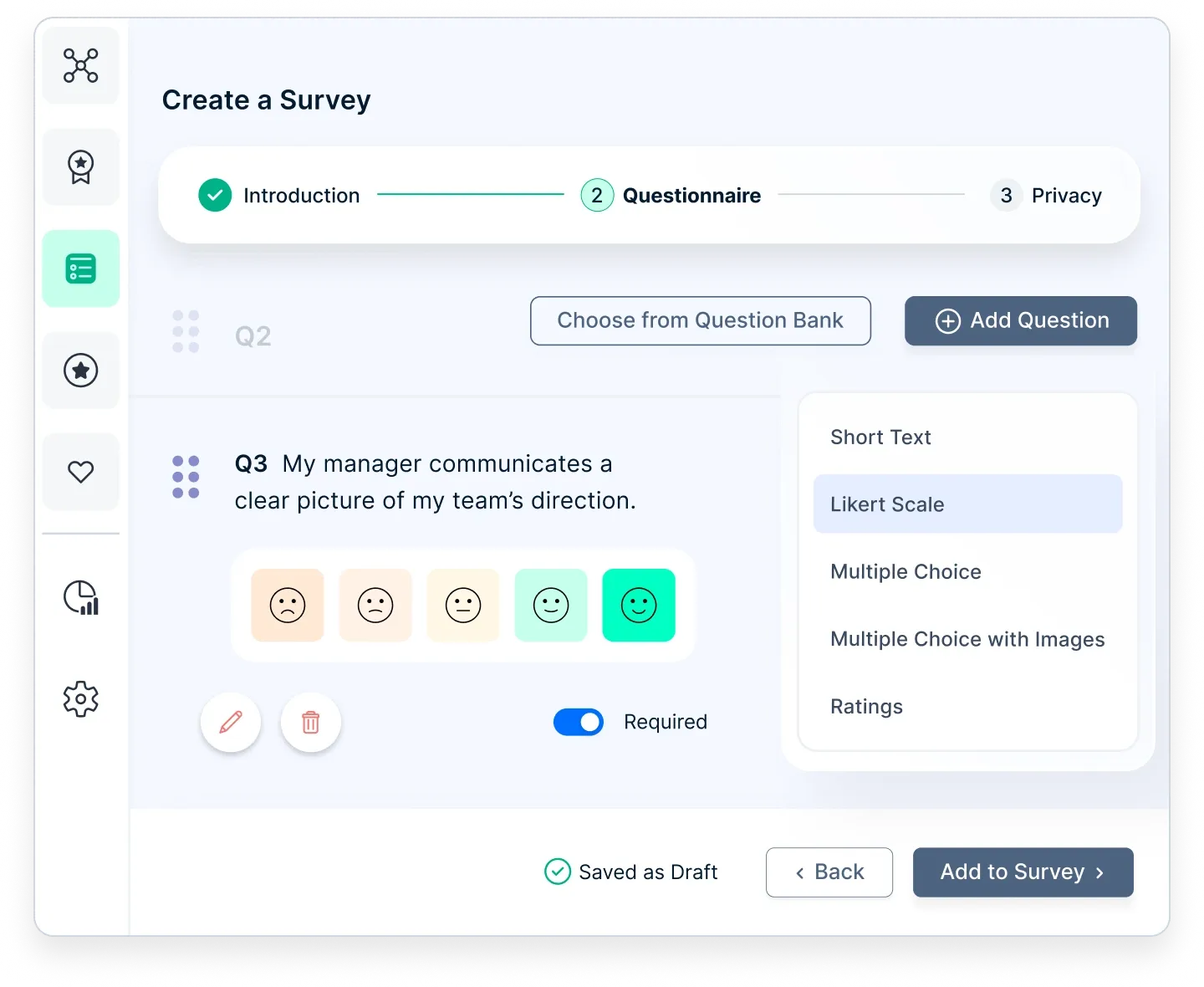70 Soalan Kajian Rakan Sebaya Penting untuk Penilaian Pekerja yang Berkesan
Looking for the best employee peer review questions for effective evaluations? We bring 70 top questions to ask during the peer review process.
Pada halaman ini
Ulasan rakan sebaya pekerja boleh menjadi alat yang berkuasa untuk meningkatkan prestasi pasukan dan mewujudkan tenaga kerja yang lebih terlibat dan produktif. Apabila dilakukan dengan betul, ulasan rakan sebaya memberikan peluang yang berharga bagi ahli pasukan untuk menawarkan maklum balas dan mengenal pasti bidang untuk pertumbuhan dan pembangunan.
However, crafting practical peer review questions can be a challenge. It's essential to ask the right questions that will elicit honest, constructive feedback that can be used to drive meaningful change.
In this blog, 70 employee peer review questions cover various topics, from communication and collaboration to leadership and work quality.
Whether you're a manager or team leader looking to improve your team's performance or an employee seeking to provide feedback to your colleagues, these questions will provide a helpful starting point for your peer review process.
What are employee peer reviews?
Employee peer review is a feedback process where colleagues evaluate each other's performance, contributions, and workplace interactions. Unlike traditional manager-led evaluations, peer reviews provide insights from team members who work closely together, offering a more well-rounded assessment of an employee’s strengths, collaboration skills, and areas for improvement.
Peer reviews help organizations foster a culture of transparency, continuous learning, and teamwork, ensuring that employees receive constructive feedback from those who directly experience their work and professional behavior.
Mengapa menjalankan ulasan rakan sebaya pekerja penting?
Employee peer reviews are crucial in building a transparent and feedback-driven workplace. Unlike manager-led evaluations, peer reviews offer firsthand insights from colleagues who interact daily, making the feedback more relevant and actionable.
- Provides a 360-degree perspective: Peer reviews complement traditional performance reviews by offering feedback from different levels of interaction, ensuring a well-rounded assessment of an employee’s contributions.
- Enhances collaboration and teamwork: When employees evaluate each other, they develop a deeper understanding of teamwork, communication styles, and shared responsibilities, strengthening workplace relationships.
- Encourages professional growth: Honest feedback from peers highlights strengths and areas for improvement, helping employees focus on skill development and career growth.
- Reduces manager bias: Since peer reviews come from multiple colleagues, they provide a more balanced and fair evaluation, reducing the risk of biased or one-sided assessments.
- Promotes a culture of continuous feedback: Regular peer reviews create an open environment where employees feel comfortable giving and receiving feedback, leading to higher engagement and accountability.
By incorporating peer reviews into the performance evaluation process, organizations empower employees to learn from each other, improve workplace dynamics, and drive overall team success.

Enhance Peer Reviews with Empuls
Empuls makes peer reviews seamless with automated surveys and insightful analytics. Gather structured feedback, improve collaboration, and foster a culture of continuous growth. Start using Empuls today.
70 Employee peer review questions to enhance workplace growth
Employee peer reviews provide valuable insights into teamwork, communication, and workplace effectiveness. By asking the right questions, organizations can identify strengths, address areas for improvement, and create a more collaborative and high-performing work environment.
Common employee peer review questions
The most crucial employee peer review questions focus on collaboration, communication, accountability, and professional growth. These questions help employees gain constructive feedback from colleagues, fostering a culture of transparency, teamwork, and continuous improvement.
1. What are this employee's strengths?
2. Apa yang perlu dilakukan oleh pekerja ini?
3. [Kepada semua orang dalam peranan kepimpinan] Sekiranya anda pemimpin itu, apakah perkara pertama yang akan anda lakukan?
4. Apakah tiga atau empat perkataan yang akan anda gunakan untuk menggambarkan pekerja ini?
5. Seberapa baik orang ini menyesuaikan diri dengan perubahan keutamaan?
6. Di kawasan apa yang anda mahu orang ini bertambah baik?
Sebagai contoh
- "Orang ini secara berkesan mengutamakan beban kerja mereka dan memenuhi tarikh akhir."
- "Orang ini berkomunikasi dengan jelas dan berkesan dengan saya dan rakan sekerja lain."
9. Apakah yang perlu dilakukan oleh pekerja ini?
Sebagai contoh:
- "Orang ini mempunyai kemahiran kepimpinan yang kuat."
- "Orang ini mempunyai kemahiran komunikasi yang kuat dan membantu semua orang berasa dialu-alukan dalam pasukan."
10. Berikan contoh nilai perniagaan yang dibawa oleh orang ini.
Sebagai contoh
- "Orang ini sentiasa memberi maklum balas tepat pada masanya dan cekap."
- "Orang ini lebih suka kerja berpasukan di atas segalanya."
11. Apa yang perlu dilakukan oleh pekerja ini?
Sebagai contoh
- "Orang ini sentiasa mencari penyelesaian kreatif dan proaktif dalam menyelesaikan masalah."
- "Pekerja ini sentiasa terbuka kepada maklum balas negatif dan positif."
12. Seberapa baik orang ini menguruskan masa dan beban kerja mereka?
Sebagai contoh
- "Orang ini sangat merangkumi nilai-nilai syarikat kami."
- "Orang ini menghargai pandangan yang berbeza, walaupun mereka berbeza dari pandangannya sendiri."
13. How effectively did your colleague contribute to team projects and goals?
14. Adakah rakan sekerja anda boleh dipercayai dalam memenuhi tarikh akhir dan menyelesaikan tugas yang diberikan?
15. Seberapa baik rakan sekerja anda berkomunikasi dengan ahli pasukan dan jabatan lain?
16. Did your colleagues collaborate effectively with others, or did they work independently?
17. Adakah rakan sekerja anda menunjukkan kemahiran menyelesaikan masalah yang kuat?
18. Adakah rakan sekerja anda proaktif dalam mendapatkan maklum balas dan meningkatkan kerja mereka?
19. Adakah rakan sekerja anda mengambil alih kerja mereka dan bertanggungjawab atas kesilapan mereka?
20. Seberapa baik rakan sekerja anda menyesuaikan diri dengan perubahan dan menangani situasi yang mencabar?
21. Adakah rakan sekerja anda memberikan maklum balas dan sokongan yang membina kepada rakan sebaya mereka?
22. Adakah rakan sekerja anda menunjukkan sikap positif dan menyumbang kepada persekitaran kerja yang positif?
23. Adakah rakan sekerja anda menghormati dan profesional dalam interaksi mereka dengan orang lain?
24. Adakah rakan sekerja anda menunjukkan kemahiran kepimpinan yang kuat apabila perlu?
25. Seberapa baik rakan sekerja anda menguruskan masa dan beban kerja mereka?
26. Adakah rakan sekerja anda menunjukkan perhatian yang kuat terhadap perincian dan menghasilkan kerja berkualiti tinggi?
27. Adakah rakan sekerja anda terbuka untuk mempelajari kemahiran baru dan menghadapi cabaran baru?
28. Did your colleague commit to their personal and professional growth?
29. Adakah rakan sekerja anda secara aktif berusaha untuk membangun dan mengekalkan hubungan positif dengan ahli pasukan dan pengurus?
30. Adakah rakan sekerja anda menunjukkan kemahiran organisasi yang kuat?
31. Adakah rakan sekerja anda menunjukkan etika kerja yang kuat dan komitmen terhadap matlamat dan nilai organisasi?
32. Did your colleague contribute to a workplace culture of innovation and creativity?
Peer-to-peer feedback questions
Peer feedback helps employees understand how their colleagues perceive their strengths, collaboration skills, and areas for improvement.
It fosters a culture of continuous learning, teamwork, and accountability, ensuring that employees contribute positively to their teams. Here are ten essential questions to include in a peer review process.
33. Apa yang saya lakukan dengan baik sekarang, dan di mana saya boleh bertambah baik?
34. Do you believe I interact with my teammates enough?
35. Bagaimanakah saya boleh membantu anda dalam pekerjaan anda dengan lebih berkesan?
36. Apakah kebolehan yang boleh saya mengasah untuk menjadikan diri saya pekerja yang lebih baik?
37. Bolehkah anda memberi saya ilustrasi tertentu di mana saya cemerlang?
38. Bolehkah anda memberi saya ilustrasi konkrit di mana saya boleh memperbaiki?
39. Apa yang membezakan saya dengan ahli skuad yang lain?
40. Adakah anda melihat lubang dalam profesionalisme saya?
41. Adakah anda mempunyai pemikiran tambahan?
42. How effectively does this employee collaborate with others?
43. How well does this employee communicate ideas and feedback?
44. Does this employee demonstrate reliability and accountability in their work?
45. How well does this employee handle constructive feedback?
46. Does this employee contribute positively to the team’s morale and culture?
47. How does this employee handle conflicts or disagreements with colleagues?
48. Does this employee go above and beyond to help their peers?
49. How effectively does this employee adapt to change and new challenges?
50. Would you feel confident working with this employee on future projects? Why?
51. What is one area where this employee can improve, and how?
These peer-to-peer feedback questions help teams identify strengths, improve collaboration, and enhance overall workplace effectiveness, leading to a more engaged and high-performing workforce.
Essential 360-degree peer review questions
360-degree peer reviews provide a well-rounded assessment of an employee’s performance, collaboration, and professional growth from multiple perspectives. These reviews help organizations identify strengths, areas for improvement, and overall team dynamics by gathering feedback from colleagues, managers, and subordinates. Below are ten essential questions for meaningful insights to include in a 360 peer review process.
52. How well does this employee handle feedback and apply it to their work?
53. Does this employee contribute innovative ideas or solutions to challenges?
54. How does this employee demonstrate accountability for their work?
55. How effectively does this employee manage workplace relationships?
56. How well does this employee adapt to process, project, or team dynamics changes?
57. How does this employee contribute to a positive and inclusive workplace culture?
58. How effectively does this employee communicate their ideas and feedback?
59. How would you describe this employee’s problem-solving skills under pressure?
60. How effectively does this employee collaborate with team members?
Using these 360-degree peer review questions, organizations can gain deeper insights into employee performance, foster collaboration, and develop professional growth and workplace improvement strategies.
Peer review questions for coworkers
Coworker feedback is valuable for understanding team dynamics, collaboration, and individual contributions. A structured peer review process helps employees gain insights into their strengths and areas for improvement, fostering a culture of teamwork and continuous learning.
Below are ten essential peer review questions for coworkers to enhance feedback and workplace relationships.
61. How well does this coworker collaborate with team members?
62. Does this coworker actively listen and respect different perspectives?
63. How effectively does this coworker communicate within the team?
64. Does this coworker take initiative and contribute new ideas?
65. How reliable is this coworker in meeting deadlines and commitments?
66. Does this coworker handle feedback professionally and make improvements?
67. How well does this coworker support and assist team members when needed?
68. Does this coworker contribute to a positive and inclusive team culture?
69. How effectively does this coworker adapt to changes in work or processes?
70. What is one strength this coworker brings to the team, and what is one area they could improve?
Using these peer review questions for coworkers helps teams identify collaboration strengths, improve communication, and build a more supportive work environment.
Petua untuk menyediakan soalan ulasan rakan sebaya pekerja
Berikut ialah beberapa petua untuk membentuk soalan ulasan rakan sebaya pekerja yang berkesan untuk tinjauan:
1. Keep it specific
Elakkan soalan yang samar-samar atau umum yang boleh membawa kepada tindak balas yang samar-samar atau tidak membantu. Sebaliknya, fokus pada bidang prestasi atau tingkah laku tertentu yang ingin anda nilaikan.
2. Jadikannya objektif
Pastikan soalan-soalan itu objektif dan boleh diukur. Elakkan soalan yang berdasarkan pendapat subjektif atau kecenderungan peribadi.
3. Tanya soalan terbuka
Walaupun soalan tertutup (soalan ya / tidak) boleh berguna, soalan terbuka membolehkan jawapan yang lebih terperinci dan bijaksana yang dapat memberikan lebih banyak pandangan.
4. Sesuaikan soalan dengan peranan
Peranan yang berbeza memerlukan kemahiran dan tanggungjawab yang berbeza, jadi pastikan soalan anda disesuaikan dengan pekerjaan atau jabatan tertentu.
5. Elakkan soalan utama
Elakkan soalan yang boleh membawa kepada bias atau mempengaruhi jawapan responden. Pastikan soalan neutral dan elakkan daripada memimpin responden kepada jawapan tertentu.
6. Pastikan ia relevan
Ensure that the questions are relevant to the employee's job and responsibilities. Ask meaningful and useful questions for both the employee and the organization.
7. Pastikan ia pendek
Elakkan membuat tinjauan terlalu lama, kerana ini boleh menyebabkan keletihan tinjauan dan mengurangkan kadar tindak balas. Pastikan soalan ringkas dan tepat.
8. Uji juruterbang soalan
Before launching the survey, a pilot test of the questions was performed with a small group of employees. This can help you identify any potential issues with the questions and make adjustments before sending the survey out to the wider team.
Streamline employee peer reviews with Empuls
Gathering peer feedback is essential for improving collaboration, performance, and workplace culture. Empuls simplifies the peer review process with customizable templates, automated surveys, and AI-powered analytics, ensuring that feedback is structured, actionable, and effective.
Empuls helps organizations enhance transparency, encourage continuous learning, and create a more engaged workforce through seamless peer reviews. Start using Empuls today to build a feedback-driven workplace.
Pemikiran akhir
Employee peer reviews can be helpful for organizations to gather feedback and improve the performance of their employees. By utilizing the right questions, managers and team leaders can gain valuable insights into their team's strengths and weaknesses while also identifying areas for improvement.
The 70 employee peer review questions outlined in this article cover various topics, including communication, teamwork, leadership, and work quality.
These questions can be adapted to suit any organization's specific needs and can facilitate constructive conversations between team members.
Pada akhirnya, kejayaan ulasan rakan sebaya pekerja bergantung kepada budaya kepercayaan, ketelusan, dan komunikasi terbuka dalam organisasi. Apabila pekerja berasa selesa memberikan maklum balas dan menerima maklum balas, semua orang mendapat manfaat.
You can create a more engaged, motivated, and productive team by incorporating peer reviews into your performance management process.
Soalan lazim
1. How can I prepare for an employee peer review?
Untuk menyediakan semakan rakan sebaya pekerja, anda harus:
- Semak huraian kerja dan matlamat prestasi anda
- Renungkan kekuatan dan kelemahan anda
- Pertimbangkan contoh khusus pencapaian dan cabaran anda sepanjang tahun lalu
- Kenal pasti bidang untuk penambahbaikan dan latihan atau sokongan yang anda perlukan untuk mencapai matlamat anda
- Bersikap terbuka kepada maklum balas yang membina daripada rakan sekerja anda.
2. How can managers ensure that employee peer reviews are effective?
Untuk memastikan ulasan rakan sebaya pekerja berkesan, pengurus harus:
- Menyediakan garis panduan dan jangkaan yang jelas untuk proses semakan
- Menggalakkan maklum balas yang jujur dan membina
- Memberi latihan dan sokongan kepada pekerja tentang cara memberi dan menerima maklum balas dengan berkesan
- Gunakan maklum balas untuk memaklumkan keputusan mengenai prestasi, latihan dan peluang pembangunan
- Memastikan maklum balas dirahsiakan dan tidak digunakan untuk tujuan punitif.













